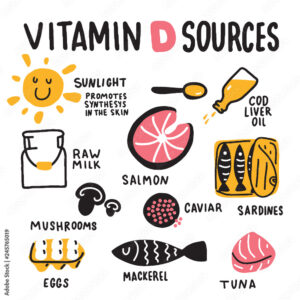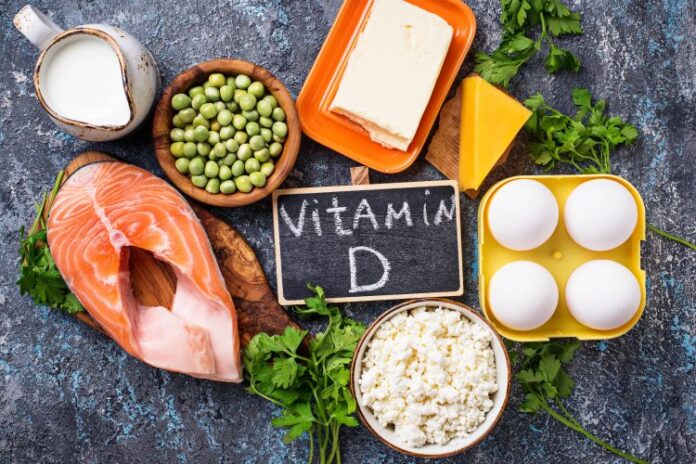Vitamin D is a fat-soluble vitamin crucial in promoting optimal health and wellness.
Our body produces vitamin D naturally when the skin is exposed to sunlight. However, many people do not get enough sunlight to produce sufficient vitamin D, and therefore, may need to obtain it from other sources, such as food or supplements.
Functions and Benefits
One of the most important roles of vitamin D is in supporting bone health. It helps the body absorb calcium and phosphorus, which are essential for maintaining strong and healthy bones. This is important for individuals of all ages, but it is particularly important for children and teenagers, who are still growing and developing. Without sufficient vitamin D, the body cannot properly absorb these minerals, leading to a condition known as vitamin D deficiency. This can cause the bones to become weak and brittle, leading to conditions such as osteoporosis and rickets.
Vitamin D is also necessary for regulating the growth and development of cells. It helps to maintain healthy skin, hair, and nails, and can even help protect against skin conditions such as acne and eczema.
It helps the body produce antibodies that fight off infections and diseases. This is why vitamin D is often referred to as the “sunshine vitamin.” Adequate levels of vitamin D may help reduce the risk of developing conditions such as respiratory infections, the flu, and even some types of cancer.
Vitamin D is also important for maintaining healthy blood sugar levels. It helps the body use insulin, which is a hormone that helps regulate blood sugar levels. Insufficient levels of vitamin D can lead to an increased risk of developing type 2 diabetes. By maintaining healthy levels of vitamin D in the body, individuals can help to reduce their risk of developing these chronic conditions.
Moreover, vitamin D is important for promoting healthy muscle function. It helps the muscles use calcium, which is essential for proper contraction and relaxation. This can help improve muscle strength and function, and may even reduce the risk of falls in older adults.

To ensure that you are getting enough vitamin D, it is important to get regular exposure to sunlight, eat a balanced diet that includes sources of vitamin D.
Some common sources of vitamin D.
For Vegetarians –
- Mushrooms: Mushrooms are a great source of vitamin D, with one cup of sliced mushrooms providing around 400 IU of vitamin D. They also contain other essential nutrients such as protein, fiber, and antioxidants.
- Fortified dairy products: Milk, cheese, and yogurt are all good sources of vitamin D, as they are often fortified with the nutrient. One cup of fortified milk can provide around 100-150 IU of vitamin D.
- Fortified cereals: Many breakfast cereals are fortified with vitamin D, making them a convenient source of the nutrient. Check the labels to see how much vitamin D is included in a serving.
- Fortified orange juice: Some brands of orange juice are fortified with vitamin D, so check the labels to see how much is included in a serving.
- Fortified tofu: Tofu is another food that can be fortified with vitamin D, making it a good option for vegetarians and vegans.
- Fortified plant-based milks – many plant-based milks, such as soy, almond, and oat milk, are fortified with vitamin D. One cup of fortified plant-based milk can provide up to 100 IU of vitamin D.
- Fortified nutritional yeast: Nutritional yeast is a type of yeast that is often fortified with vitamin D, making it a good option for vegetarians and vegans. One tablespoon of nutritional yeast can provide around 100 IU of vitamin D.
- Sun-dried tomatoes – sun-dried tomatoes are a good source of vitamin D, providing about 25 IU per cup.
- Sunflower seeds – sunflower seeds are a good source of vitamin D, providing about 25 IU per quarter cup.
For Non-Vegetarians –
Along with the above foods, you can consume from the below listed items.
- Salmon – A 3-ounce serving of cooked salmon contains approximately 450 International Units (IU) of vitamin D.
- Tuna – A 3-ounce serving of canned tuna contains approximately 200 IU of vitamin D.
- Egg yolks – One large egg yolk contains approximately 40 IU of vitamin D.
- Sardines – A 3-ounce serving of canned sardines contains approximately 250 IU of vitamin D.
- Shrimp – A 3-ounce serving of cooked shrimp contains approximately 200 IU of vitamin D.
- Cod liver oil – One tablespoon of cod liver oil contains approximately 1,360 IU of vitamin D.
Here are some recipes that are rich in vitamin D:

- Wild salmon with roasted vegetables: This dish is packed with vitamin D from the salmon, as well as other essential nutrients from the vegetables. Simply roast some salmon fillets and your favorite vegetables, such as bell peppers and zucchini, in the oven with olive oil and seasonings.
- Egg and spinach breakfast scramble: Eggs are a good source of vitamin D, and combining them with nutrient-rich spinach makes for a healthy and satisfying breakfast. Simply scramble some eggs in a pan, then add in some chopped baby spinach and cook until the spinach is wilted. Serve with toast or a whole grain muffin for a complete meal.
- Tofu and mushroom stir-fry: Tofu is often fortified with vitamin D, making it a good choice for a meal that is rich in this nutrient. Try stir-frying some tofu with sliced mushrooms and your favorite vegetables, such as bell peppers and broccoli, in a wok or large frying pan. Serve over rice or noodles for a satisfying meal.
- Shrimp and avocado salad: Shrimp is a great source of vitamin D, and pairing it with avocado provides healthy fats that can help your body absorb the nutrient. Simply toss cooked, peeled shrimp with sliced avocado, cherry tomatoes, and your favorite salad greens. Drizzle with a citrus dressing for added flavor.
Remember to consult with a healthcare professional or registered dietitian if you have any concerns about your vitamin D intake or if you are at risk for deficiency.
